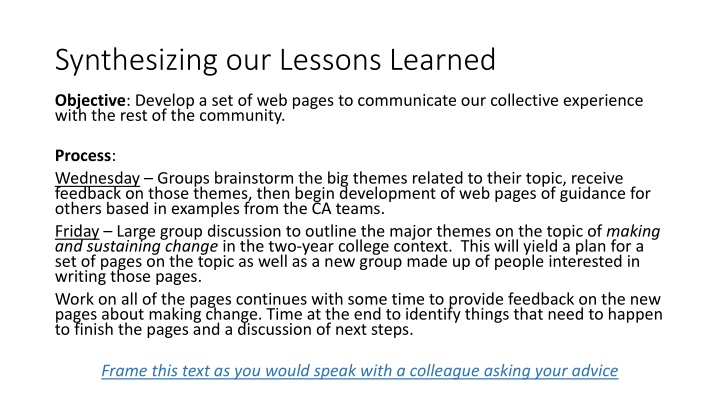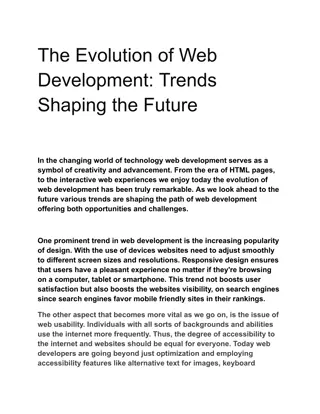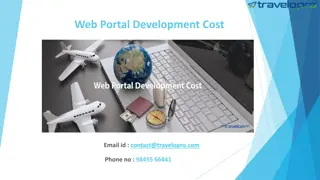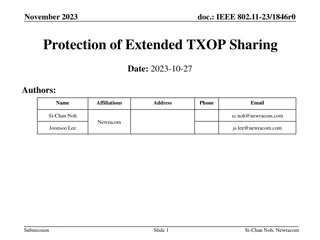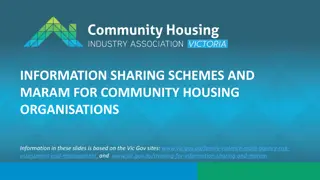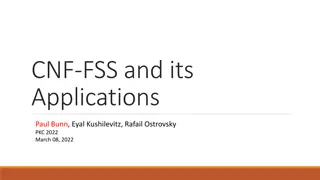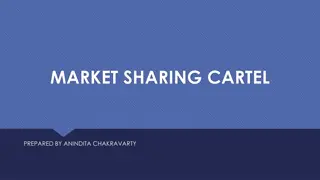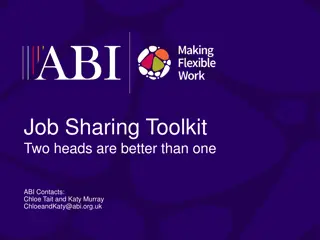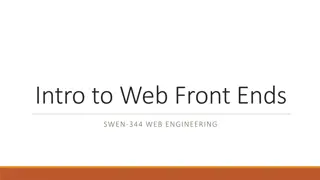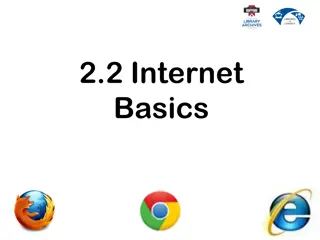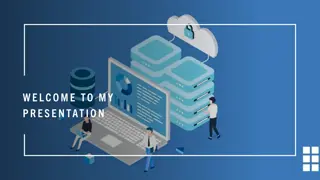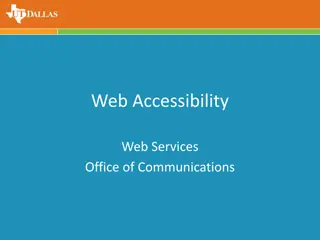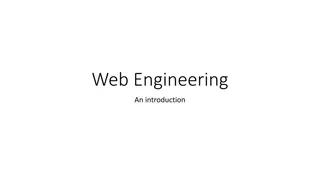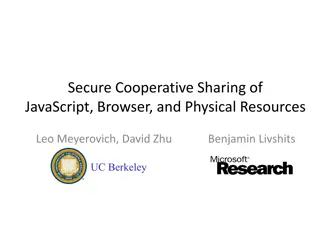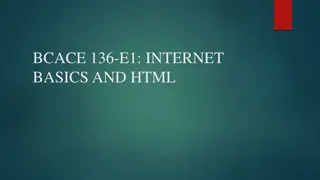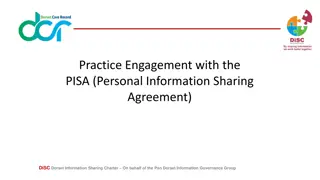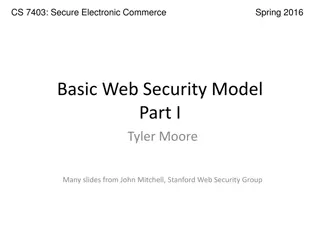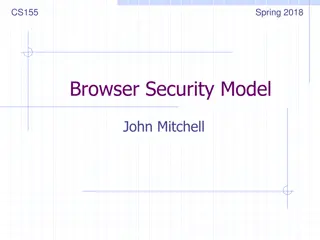Web Page Development for Sharing Experiences
Develop a set of web pages to share collective experiences with the community. Groups brainstorm big themes, receive feedback, and create guidance web pages based on examples. A large group discussion outlines major change themes in two-year college contexts, forming a plan for new web pages. The process involves ongoing work with feedback sessions, identifying areas for completion, and discussing next steps.
Download Presentation

Please find below an Image/Link to download the presentation.
The content on the website is provided AS IS for your information and personal use only. It may not be sold, licensed, or shared on other websites without obtaining consent from the author.If you encounter any issues during the download, it is possible that the publisher has removed the file from their server.
You are allowed to download the files provided on this website for personal or commercial use, subject to the condition that they are used lawfully. All files are the property of their respective owners.
The content on the website is provided AS IS for your information and personal use only. It may not be sold, licensed, or shared on other websites without obtaining consent from the author.
E N D
Presentation Transcript
Synthesizing our Lessons Learned Objective: Develop a set of web pages to communicate our collective experience with the rest of the community. Process: Wednesday Groups brainstorm the big themes related to their topic, receive feedback on those themes, then begin development of web pages of guidance for others based in examples from the CA teams. Friday Large group discussion to outline the major themes on the topic of making and sustaining change in the two-year college context. This will yield a plan for a set of pages on the topic as well as a new group made up of people interested in writing those pages. Work on all of the pages continues with some time to provide feedback on the new pages about making change. Time at the end to identify things that need to happen to finish the pages and a discussion of next steps. Frame this text as you would speak with a colleague asking your advice
Examples Supporting STEM Success in a Liberal Arts Context - https://serc.carleton.edu/liberalarts/index.html InTeGrate Program Models - https://serc.carleton.edu/integrate/programs/implementation/index. html#synthesis A Community Framework for Geoscience Education Research - https://nagt.org/nagt/geoedresearch/GER_framework/index.html STEM Education Center Toolkit - https://serc.carleton.edu/StemEdCenters/toolkit/index.html
Working Groups Supporting Academic Success of All Students (Tania Anders, Pete Berquist, Karen Braley, Rick Glover, Mel Johnson, Adrianne Leinbach, David Voorhees) Facilitating Students' Career Pathways (Wendy Baker, Bryn Benford, Karen Layou, Gretchen Miller, Dave Mrofka, Elizabeth Nagy-Shadman) Supporting 2YC/4YCU Transfer (Andrea Bair, Callan Bentley, Deron Carter, Chris DiLeonardo, Catherine Etter, Eriks Puris, Dana Vulkajovich) Increasing Diversity and Inclusion (Kristie Bradford, Mark Boryta, Caitlin Chazen, Andy Hilt, Shannon Othus-Gault, Cheryl Resnick, Sean Tvelia) Building a Regional Community (Daina Hardisty, Bridget James, Lynsey Lemay, Michael Vendrasco, Becca Walker, Keith West, Debra Woodall)
Initial Themes (1 hour) Individually, write down 3-5 insights, practices, or things that struck you about your topic from reading the other Team s pages on sticky notes. One thought or idea per sticky note. As a table group discuss, expand, and organize the thoughts and ideas into 3-4 broad themes that encompass what you have to say about your topic. On your group s first workspace page, record the broad themes as well as practices and other more granular ideas that came out of your discussion. Also make note of examples that showcase the themes and practices and where they came from (e.g. a Team webpage, an issue of Musings, etc.).
First Review (0.5 hour) Each group will get 3 minutes to present and describe the broad themes they saw rising out of the collective work. Name the themes and give a short description of the kinds of practices and ideas that come under each one. Each team will speak from its workspace page. Everyone else will have 2 minutes to write at least one constructive comment, suggestion, question, or possible example on a sticky note. One comment per sticky. These will be collected and given to each team following all the review presentations.
Writing Time (2 hours) Spend a few minutes reading and incorporating the feedback you got from the whole group. Using the other workspace pages (subpage 1, 2, ) for your group, begin writing about each of the broad themes individually. Write a short paragraph describing the theme. Break down each of the broad themes into practices that address that theme and start to write directive text. Frame this text as you would speak with a colleague asking your advice. Point to specific examples of these practices in the CA team pages or other sources. For each, write a few sentences connecting the example to the directive text. Break up the large working group into smaller segments to work on more than one page at a time.
Second Review (0.5 hours) Individually review (at least) two other groups pages and leave substantive comments in the discussion threads at the bottom of the pages. First: Each individual reviews the next group s pages. Members of Group 1 reviews Group 2 pages, members of Group 2 reviews Group 3 pages, etc. Second (+): Pick a topic that you are drawn to or have expertise in and review that group s pages. The most useful feedback at this stage includes: Examples from CA individuals and teams Focus on content and organization rather than grammar and punctuation Questions about where a particular example might fit in their organizational scheme. References from the research base about the theme Are there connections to other working groups or themes that should be made explicitly?
Group Time (0.5 hours) Teams read the comments they got and outline a plan for integrating the feedback into their pages. Make notes about this plan on the webpages and start making the necessary changes to respond to the reviews.
Making and Sustaining Change (0.5 hours) Individually, reflect and then write down the one or two of the best things you did or learned that allowed you to make changes that will stick. How has your growth and professional development affected your ability to make change? in your program/department in your institution in your regional network Ideas will be shared with the whole group in a round-robin to allow all tables and participants to contribute. Capturing and organizing these ideas in real time. New working group will be formed to develop pages on the topic using the ideas and themes generated by the whole group.
Working Group Time (2 hours) Original working groups continue writing and fleshing out pages on their themes. New working group on Making and Sustaining Change drafts initial pages. During the final 15 minutes, the whole group will read and provide feedback on the pages developed on Making and Sustaining Change.
Moving Forward (0.5 hours) Each group should spend 15-20 minutes thinking about where their pages are and what still needs to happen. Take notes in the team s Moving Forward page. What are the outstanding questions? Are there areas that just need more writing? Interest/ability of team members to contribute to completing the web pages after the end of the workshop? (Note particular areas where individuals want to contribute.) Next steps on the process from the project point of view.
